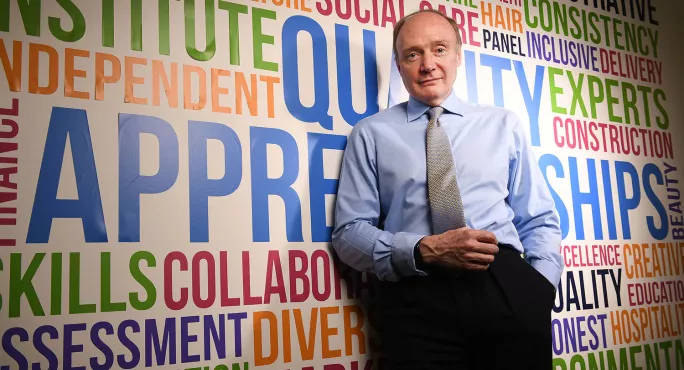
- Home
- The apprenticeship reforms depend on the success of the EPA
The apprenticeship reforms depend on the success of the EPA

For years, employers have questioned the ability of people who have undertaken vocational training programmes - including apprenticeships - with many asking: “Can they really do the job?”
People were acquiring qualifications that validated their ability to carry out individual tasks, but not necessarily becoming competent at the job at hand. Assessments were typically carried out by the trainer, which is particularly true of the old apprenticeship frameworks.
With the new apprenticeship reforms, and the introduction of independent end-point assessment (EPA), we are directly addressing this concern.
Apprentices on new apprenticeship standards will undertake a rigorous test of their occupational competence at the end of their apprenticeship. This will be conducted by someone who has expertise in the area, but has had nothing to do with the apprentice’s training or employment to date.
Final assessment
Much like the driving test, we don’t assess people’s ability to drive by asking their driving instructor to sign off in isolation that they can reverse around a corner or carry out an emergency stop. An independent assessor conducts a final assessment to test their driving ability as well as their knowledge of the Highway Code. Most importantly, it’s safe to go out on the roads because the driving test is robust and fair.
This is where we need to get to with apprenticeships. The apprenticeship reforms depend on the success of the EPA. If employers feel confident that people who have completed the EPA are competent in their occupation, the reforms will have succeeded.
I know that this is a big change, which can be unsettling. People have expressed concerns that there won’t be enough assessment organisations in place to deliver assessments. That those organisations that are in place won’t be able to find enough assessors who have the required occupational expertise and independence. Or that EPA won’t be consistent between different end-point assessment organisations (EPAOs).
Concerns overplayed
I understand these concerns, but I think they are sometimes overplayed by certain parts of the sector with a vested interest, particularly those resisting the reforms. And all of these concerns will recede in importance as the reform programme becomes more mature.
It is, for example, true that not all standards have assessment organisations on the Register of End-Point Assessment Organisations (RoEPAO). But a very detailed description of the skills, knowledge and behaviour required to complete the assessment, and the assessment methods that will be used, is available for every standard that is approved for delivery. As a result, any apprentice can find out what is expected of them, even where an EPAO is not yet in place for their apprenticeship.
This isn’t to suggest that we are in any way blasé about coverage and readiness of EPAOs. Nor are we blind to the challenges and risks of bringing a large suite of new assessment organisations into the system.
Making sure that EPA is being undertaken fairly and consistently between different assessment organisations is the role of external quality assurance (EQA). Ensuring that EQA is in place across all standards is a statutory responsibility of the Institute and we’ve created a framework which details what EQA should cover.
Assurance
Providing a clear framework for EQA is important because we’re not delivering it all ourselves. We’re asking employers who design apprenticeships to decide which organisation is best placed to give them assurance that the assessment in their sector is high quality. In some cases, that will indeed be the institute and we’re currently named as EQA provider for around 40 per cent of the published apprenticeship standards.
In other cases, where employers want only Ofqual-recognised bodies to deliver assessment, Ofqual may be the preferred EQA provider. Other employers though are choosing employer-led groups or professional bodies to take on this role, because they place a high value on recognition of their standard by their employer group or professional body. Where this is the case, our quality assurance committee will review the proposed organisation’s approach to EQA to ensure that it complies with our framework. They also consider whether that organisation can perform the role in a truly independent fashion, which includes checking there are no links to assessment organisations that might compromise an organisation’s ability to undertake EQA fairly.
We have approved five organisations to act as EQA providers so far, with more in the pipeline. These organisations - whether it’s the Worshipful Company of Saddlers quality assuring the saddlery assessment, or People 1st in the hospitality sector - will ensure that EPA is conducted fairly and give employers the assurance they need that apprentices completing assessment in their sector are fit to do the job they’ve been trained for. In addition, providers will deliver EQA as prescribed by the Institute to ensure that EQA itself is consistent and fair.
Sir Gerry Berragan is chief executive of the Institute for Apprenticeships
Register with Tes and you can read five free articles every month, plus you'll have access to our range of award-winning newsletters.
Keep reading for just £4.90 per month
You've reached your limit of free articles this month. Subscribe for £4.90 per month for three months and get:
- Unlimited access to all Tes magazine content
- Exclusive subscriber-only stories
- Award-winning email newsletters
You've reached your limit of free articles this month. Subscribe for £4.90 per month for three months and get:
- Unlimited access to all Tes magazine content
- Exclusive subscriber-only stories
- Award-winning email newsletters

